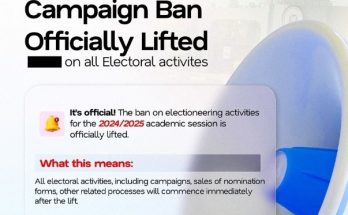By: Akinmoyeje Precious
Quite Oblivious of his environment, Adekunle thinks out loud about his life after graduation, in his exact words: “I am currently 16 years old, I’ll graduate by 20, serve my fatherland and voila! At age 21, I will be done and dusted”. He was jolted out of his beautiful reverie by an uproar of laughter by some senior students sitting close to him, his face suddenly changed to a “what exactly is funny” kind of expression. Knowing fully well that this kid is a rookie, one of them told him to wake up to reality and reminded him of the extra ‘x’ number of years which he needed to add, especially in this University of Ibadan, the other students interjected. Extra number of years? Wake up to reality! He comes to understand the meaning of these statements in his subsequent years of stay on Campus.
Strike actions are gradually becoming an annual culture in Nigerian universities. Of course, the most adverse effects of these actions are seen on students’. This gives credence to the proverb of the fighting elephants and the suffering grass. In this case, pressure groups (ASUU, NASU SSANU e.t.c) and the federal government are the elephants, consequently the innocent leaders of tommorow are the suffering grasses. Should we blame the pressure groups for embarking on strike actions without considering the effects? Perhaps, the Federal government for negligence of duty? Just like the proverbial mosquito that perched on a man’s scrotum, attempting to decide who takes the blame puts us in an imbroglio.
This write-up is not aimed at apportioning blame but rather taking a look into the consequences of strike actions and proffer a feasible solution in the interest of all parties involved.
THE PLIGHT OF THE GRASSES
Further analysis of the fight between elephants would show the helplessness of the poor grasses. Apparently, there is nothing they can do to make the elephants stop fighting. The situation of the grass is an allegory of the situation of students in higher institutions in Nigeria. Students have no say in important decisions that decide the turnout of strike actions. Ironically, the ones who suffer the most are the students. Generally, the purpose of industrial action is to coerce an employer (most especially, a federal government) to bend to the legal will of the employee. Apparently, the employees seem not be directly affected by any of these actions.
A situation that exemplifies the dire consequences of strike actions especially on students’ well being is the ongoing NASU strike at the University of Ibadan. Students had to write examinations with no power supply and no water in their respective hostels. The implication of that is basically hunger as most students depend on school supplied water to make their meals. After going to exams with empty stomach, the lofty dreams of life in the first and best University in the country must have turned out to be nightmare for students like Adekunle.
Aside from not having the basic amenities necessary for survival, students’ couldn’t gain access to health care. The University health care facility was shut down during the industrial action. In the words of a 100 level student who pleaded anonymity “I went to Jaja after my first paper because I had a fever, when I got there, the people meant to attend to students’ were not available. The available nurses told me to go home and take anti-malaria drugs pointing out that my illness was not an emergency. I had to go to the exam center the next day with my hands shaking…” Sad, isn’t it?
Strike actions do not only have short term effects on students’ life, it goes way beyond to the future (as dictated by the Nigerian economic principles), the same future where students’ are meant to be the leaders of tomorrow. Just like Adekunle, students have stayed longer than expected on campus and apparently, no man’s age is static. Ironically, there seem to be certain age specifications in the labor market of the country. Putting these pieces together, it sure looks like the there is no consideration at all in the present and the future of the beloved Nigerian youth.
HOW THE ELEPHANTS THINK
One may start to wonder if the members of these pressure groups are even human. Does the executive body of the country contain any emotions? Why does this have to go on and on? Looking from the perspective of a government worker (lecturers and other non-teaching staffs in the University), it is only right to be paid after working. Demonstrations like strike is the way to show the federal government their relevance and seriousness. Sometimes, these unions highlight reasons that appear in the interest of the students. In all sense of altruism, it would be rather selfish to tell them to just back down from what appears to be their right by virtue of the law.
The federal and states governments and sometimes the University management (as in the case of the ongoing NASU strike in UI) give reasons ranging from insufficiency of fund to political reasons. In some instances, the requests of the workers are not provided for God-knows-why.
However, prolonged strike action betrays whatever reason any of the parties may have. On the part of the Unions, it is not necessary to do the same thing repeatedly without any positive results. Strike actions have started since as far back as 1980 and it has only produced temporary solutions with sometimes more complicating future consequences.
WHAT ARE THE LIKELY WAYS OUT?
To every problem there is a solution. There are means of going around this issue that will be beneficial to all the parties involved. To start with, it would be logical to first address the apparent nonchalant attitude of these authorities. Stakeholders appointed to oversee education in federal and state ministries should be appointed from a category of senior career educationist. These individuals know the challenges faced by the education sector and how best to tackle them.
Furthermore, decisions shaping policies in the educational sector should be made by stakeholders with the involvement of parents of higher institution students’ and youths. Any consensus reached in making such policies would be to the fair advantage of the parties involved. Most importantly, even in the event of strike actions, the welfare of students should be considered before any rash decisions are taken.
Finally, it is one thing to make policies, it is another to adhere to the provisions of the policies. Certain principles made after considering the aforementioned points should be strictly followed by the parties involved. If possible, stringent punishment should be attached to any party that defaults. The importance of higher institutions in shaping the literate man cannot be over-emphasized, it is therefore important that nothing is done to jeopardize the future of the upcoming generation. God bless Nigeria.



